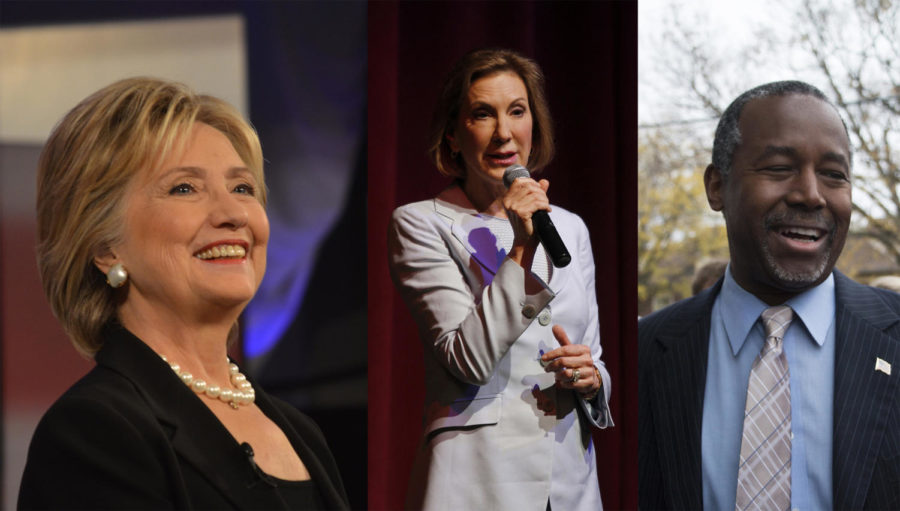Carstens: gender, race shouldn’t play factor in elections
Photo illustration
Carstens thinks that candidates shouldn’t let either gender or race impact their choices, and neither should we as voters when we choose our next president.
November 11, 2015
Race and gender have always played a big role in society, but how much of a role should it play in a person’s vote when the 2016 presidential election rolls around? It shouldn’t take any significant part in a constituent’s vote, but the more I continue to speak to people about the race, the more I am concerned about how the next president may be Hillary Clinton, Carly Fiorina or Ben Carson because of their race and/or gender and not their credibility.
While some may argue that a candidate’s gender or race does not affect a voter’s attitude toward the individual, there are studies that prove these factors do have an impact. When a female candidate runs for any office, people judge her on how she looks and are more likely to ask her about her family, but you won’t really see this happening with men. You see people commenting on what Fiorina or Clinton wore to a debate, but you hardly see them worrying about what tie Donald Trump is wearing.
This same idea of judgment based on gender is even exchanged between candidates, demonstrated most recently when Trump called out Fiorina for her physical appearance.
With the Black Lives Matter campaign that is taking the country — and campuses — by storm, I could easily see more individuals voting for Carson. Carson should get the votes of people who honestly believe in his ideas and beliefs, not because of the ongoing racial tension in America.
Humans have the basic instinct to instantly assume things about certain types of people simply based on looking at a person’s face, although no one likes to admit it.
In high school, for example, we used to use stereotypes for people all the time, and that’s where cliques came from. The jocks were all players, the geeks and nerds were all brainiacs and the goths were all deemed mentally unstable. As we’ve grown, we’ve also learned that associating certain types of people with certain behaviors or actions is wrong, but we still do it.
These habits of making automatic assumptions about groups of people are factors whenever we make any sort of decision, but we need to at least be conscious of it while debating who to vote for, especially with the wide range of different characters we see fighting for the presidency.
Just last week, I was discussing the presidential race with some friends, and I discovered two alarming things.
One was that the people I’m friends with are liberals, which made me the outcast during this particular discussion, and second was that some of my fellow voters believe that voting for Clinton would create a legacy for the next generation because we are breaking the stereotype of white male Protestants being president. Frankly, I was appalled by this.
We should not vote for someone based on gender or race but on their core values and ideas. Personally I am a Carson supporter all the way, and when I tell people this, they immediately say something that makes it sound like I’m voting for him because he is African-American.
This is not true, and I get upset when individuals make those kind of assumptions. I like Carson because he seems to be a candidate who knows what he wants to accomplish, has an attitude that he is truly going to accomplish it but, most importantly, his ideas align with mine.
The gender and race cards should not be played during elections. When I think of either being used heavily in politics, I hear Hillary Clinton’s voice in the back of my head saying, “If equal pay for equal work is playing the ‘gender card,’ then deal me in.”
A person’s gender or race does not define him or her. It plays a part in who they are, but candidates shouldn’t let either impact their choices and neither should we as voters.

















